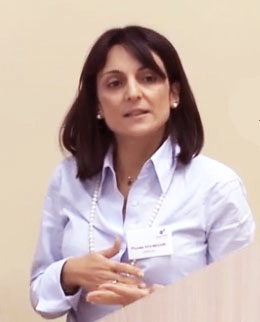Editor Profile

Phoebe Koundouri
University/Organization: Athens University of Economics and Business
Country: Greece
Biography
Professor Dr. Phoebe Koundouri holds a PhD (2000), MSc (1996) and MPhil (1995) in Economics from the University of Cambridge (UK). She is Professor in Economic and Econometric Theory and Applications (with special emphasis on Natural Resources, Energy and the Environment) at the School of Economics, Athens University of Economics and Business (Greece). She is also Founder and Scientific Director of the Research Laboratory: ReSEES: Research on Socio-Economic and Environmental Sustainability (http://www.icre8.eu/resees) at the same University. Since 2013 she is also a Visiting Senior Research Fellow at the CCCEP: Centre for Climate Change Economics and Policy (www.cccep.ac.uk/people/), London School of Economics (UK).
Phoebe Koundouri is the Founder and Scientific Director of the non-for-profit ICRE8: International Center for Research on the Environment and the Economy (www.icre8.eu). ICRE8 is the host of the United Nations Sustainable Development Solutions Network (UNSDSN)-Greece (www.unsdsn.gr) and Prof. Koundouri is the Co-Chair of UNSDSN-Greece.
She has published 15 edited books and monographs, and more than 250 articles in academic journals and edited volumes. She is a highly cited academic author ranked in the top 1% of all female economists in the world. She is co-editor of the official journal of the European Association of Environmental and Resource Economists, associate editor and editorial board member in 25 academic journals. She was elected Council Member (2012-2015) and Vice President of the European Association of Environmental and Resource Economists (2014-2015). She is Visiting Professor and Research Fellow in many Universities and Research Centers around the world.
In the past she held fixed-term and tenure track academic positions at the University of Cambridge, University College London, University of Reading, and many visiting positions around the world. She has been acting as an advisor, consultant and research evaluator for the European Commission, World Bank, OECD, UN, NATO, WHO, various Foundations and Governments. Since 1996, she has coordinated and/or participated, in more than 60 research projects on natural resources management issues. She has organized a number of international conferences and supervised numerous PhD students, all of them now working in academia. Over the last two decades, Phoebe Koundouri has given keynote and public lecturers all over the world, and received scholarships and prizes for academic excellence from various academic institutions and foundations.
Central to Koundouri’s research is the concept of the ‘total economic value of public goods’ and in particular the value humans derive from natural resources and their ecosystem services. Her main research goal is to refine the theoretical models and empirical methods used in the field of natural resource, ecological & agricultural economics, towards: (a) better understanding of the concept and determinants of the total economic value of ecosystem goods and services, (b) more accurate modelling of this value, (c) more robust estimation of this value, (d) more efficient integration of this value in interdisciplinary resource management and policy-making. Areas of research as per EconLit: Environmental, Natural Resources and Agricultural Economics and Econometrics; Economic Sustainability, Cost-Benefit Analysis and Discounting; Non-market Valuation; Agricultural Economics and Finance; Interdisciplinary Approaches to Natural Resources Management and Policy; Econometric Methods; Philosophy of science.
Phoebe Koundouri was born in Cyprus in 1974. She is married to Prof. Nikitas Pittis. They have three daughters, Chrysilia, Billie and Athena, and live (mainly) in Ecali (Kifisia), Athens.
Research Interest
Below a list of areas I work in, using Economic Literature and Natural Sciences traditional categorizations:
1. Agricultural Economics: Micro Analysis of Farm Firms, Farm Households, and Farm Input Markets; Agricultural Finance; Land Ownership and Tenure; Land Use; Irrigation; Agriculture and Environment; R&D and Agricultural Technology; Biofuels; Agricultural Extension Services; Agricultural Policy; Food Policy.
2. Natural Resources (Renewable and Non-Renewable) Economics and Econometrics:
Resources: Inland water (surface and groundwater) resources; Fisheries, aquaculture and oceans resources; Forest resources; Energy (renewable) sources; Biodiversity and ecosystem service (Ecological Economics); Land use; Recreational aspects of natural resources; Air.
Pollution: Air Pollution; Water Pollution; Noise; Waste.
Climate Change (and intergenerational issues).
3. Long-Run Discounting and Cost-Benefit Analysis, Economic Sustainability.
4. Uncertainty, Risk and Irreversibility, Natural Disasters.
5. Benefit Valuation: Choice Modeling, Contingent Valuation, Hedonic Pricing, Travel Cost, Benefit Transfer, Cost-Benefit Analysis.
6. Behavioral and Social Aspects: Experimental Economics, Consumption and Demand, Distributional Aspects.
7. Production and the Environment: Production/Cost Function; Micro-Econometrics, Production Technology Adoption and Diffusion; Processes, Production Under Uncertainty and Risk Preference Estimation.
8. Regulation and Instruments: Price-based MBI, Quantity-based MBI, Voluntary Approaches, Externalities, Other Market Failures.
9. Game Theory and the Environment.
10. Health and the Environment.
11. Interdisciplinary Approaches to Natural Resources Management and Policy.
12. Econometric Methods: Time Series, Cross-Section, Panel, Parametric/Non-parametric.
13. Philosophy of science applied to economics (general), econometrics and environmental and resource economics.
 Scientia Ricerca is licensed and content of this site is available under a Creative Commons Attribution 4.0 International License.
Scientia Ricerca is licensed and content of this site is available under a Creative Commons Attribution 4.0 International License.